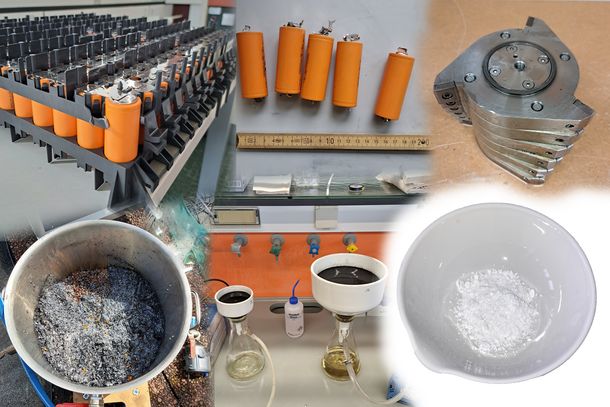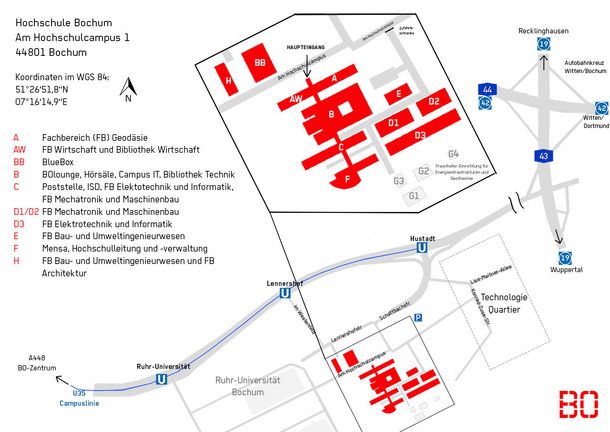Research
Current Research Projects
University cooperation promotes development of new degree programmes in Ghana
Bochum/Tamale
Bochum University of Applied Sciences (HSBO) is implementing an ambitious research and education project in Ghana: Together with the Technological University of Tamale (TaTU), curricula are being developed that focus on sustainable entrepreneurship and green technologies. Funded by the Ministry of Culture and Science of North Rhine-Westphalia, the project will run from February to July 2025 and aims to optimally prepare students for the growing demands of a sustainable job market.
Focus on sustainability and entrepreneurship
A central aspect of the project is the further development of TaTU's study programmes to anchor sustainability and entrepreneurship as key competencies. The project relies on a combination of face-to-face and digital teaching formats: lectures and practical sessions are supplemented by interactive online tools such as Moodle and Kahoot! The aim is to teach sustainable technologies and entrepreneurial concepts in a practical way.
New teaching approaches for innovative careers
There is a particular focus on developing modules that enable students to develop independent business models related to green technologies. The economic and social conditions in Ghana are specifically taken into account here. While sustainable topics are integrated into existing modules, the entrepreneurship area is to be strengthened through newly designed courses.
Cooperation and networking as the key to success
In addition to academic education, TaTU's network with industry and associations is also being intensified. A key to this is the reactivation of the ‘Friends of the University’ (FoU), which promote dialogue between universities, industry partners and other players in the economy. Through workshops and exchange programmes, students from both universities will learn from each other and jointly develop innovative ideas for sustainable development.
International cooperation for sustainable development
The project contributes to the achievement of the Sustainable Development Goals (SDGs), particularly in the area of quality education (SDG 4). Close cooperation between HSBO and TaTU is creating new opportunities for digital and lifelong learning. This will enable the training of future skilled workers who will not only succeed in the labour market but also actively contribute to sustainable transformation in Ghana.
The recovery of raw materials from material flows such as used batteries is one of the key challenges of the energy transition. Whether lithium-ion batteries from electric vehicles or classic button cells, the topic of battery recycling is becoming increasingly relevant to society and technology in view of steadily rising demand, limited resources and legal requirements.
The Urban Mining Institute at Bochum University of Applied Sciences has been conducting intensive research into the processing and recycling of used batteries for several years. In close cooperation with industry partners, as part of final theses, project seminars in bachelor's programmes and engineering studies in master's programmes, practical concepts are being developed for the recycling of a wide variety of battery types – in particular lithium-ion batteries (LIB). The focus is on wet mechanical comminution, classification and the targeted hydrometallurgical recovery of lithium in the form of lithium carbonate.
However, lithium recovery is not the only subject of research at the Urban Mining Institute; the recycling of older battery types (e.g. alkaline manganese or zinc-carbon) and batteries of the future (e.g. sodium-ion batteries) is also being continuously developed.
Regardless of the type of battery or recycling technology involved, the Urban Mining Institute has methodological experience, a technical infrastructure for sample preparation and analysis, and an active network of research and industry partners
Past Research Projects
EcoTecHub – Innovation for a sustainable region
The EcoTecHub is creating an innovation and technology centre for sustainable value creation in the district of Unna. It supports companies in the transformation of the former coal-fired power plant region. The aim is to act as a visible platform for circular economic processes and to promote innovation. By anchoring circularity as a guiding principle, the EcoTecHub strengthens regional cooperation between science and industry in the spirit of promoting innovation. The focus is on circularity and defossilisation, with an emphasis on energy and material innovations. In the long term, the aim is to strengthen circular value creation and make the regional economy more competitive. EcoTecHub supports companies in the region and beyond with an innovative approach that specifically facilitates structural change. The focus is on four closely interlinked areas of expertise: innovation, training, networking and innovation labs. The combination of technical laboratories, joint training concepts with universities, innovation-oriented networking events and the implementation of reference projects as transferable blueprints creates a unique transformation environment for companies.
You can find out more about the project and the current status of the preliminary study here:
Publications
Groote, M.; Hense, P. (2025): Entwicklung eines Pfandkonzepts für Lithium-Ionen-Batterien zur Reduktion batteriebedingter Brände durch die Steigerung der Sammelquoten. Müll und Abfall, 1-2025, DOI: 10.37307/j.1863-9763.2025.01.03
Beier, S.; Hense, P.; Klümper, C. et al. (2024): Die UN-Nachhaltigkeitsziele als interdisziplinäre Herausforderung. Aufgaben, Aspekte und Ansätze. Springer Vieweg, Wiesbaden, DOI: 10.1007/978-3-658-44103-6
Hense, P.; Schebek, L.; Vollprecht, D. et al. (2024): Festlegung von Quoten in der Kreislaufwirtschaft. Müll und Abfall, 7-2024, DOI: 10.37307/j.1863-9763.2024.07.03
Meyer, T.; Tekin, N.; Hense, P. et al. (2023): Evaluation of the cytotoxic and genotoxic potential of printer toner particles in a 3D air-liquid interface, primary cell-based nasal tissue model. Toxicology Letters, 379 (2), DOI: 10.1016/j.toxlet.2023.03.004
Peer, M.; Hense, P.; Hofmann, A.; Franke, M.; Berninger, B.; Kunz, W. (2020): Verwertung chlorhaltiger Kunststoffabfälle und Rückgewinnung kritischer Metalle. 10. DGAW-Wissenschaftskongress „Abfall- und Ressourcenwirtschaft“, DOI: 10.24406/publica-fhg-410077
Hense, P.; Reh, K.; Franke, M.; Aigner, J.; Hornung, A.; Contin, A.: Pyrolysis of Waste Electrical and Electronic Equipment (WEEE) for recovering metals and energy: previous achievements and current approaches. In: Environmental Engineering and Management Journal, 14 (7), pp. 1637 - 1647
Pretzsch, H.; Biber, P.; Uhl, E.; Hense, P.: Coarse root-shoot allometry of Pinus radiata modified by site conditions in the Western Cape province of South Africa. In: Southern Forests: a Journal of Forest Science, 74 (4), pp. 237 - 247
DE102015209742 Rohrofen und Verfahren zur chemischen Umsetzung
DE102017205020 Reaktionsvorrichtung mit Wärmetauscher und deren Verwendung
DE102018213210 Verfahren zur Reinigung mineralischer Feststoffe und Holzmaterialien, Vorrichtung für dieses Verfahren und deren Verwendung
Information and current topics for theses at the Urban Mining Institute can be found here. If you are interested or have ideas for your own topics, please contact us for further information.
Theses supervised to date:
2025
- Luisa, Meister (M.Sc.): Characterizing Mesophotic Coral Reef Diversity on a Caribbean Seamount Using Environmental DNA: A Baseline for Conservation
- Lea, Klenke (M.Sc.): Zirkuläre Geschäftsmodellinnovationen in der deutschen Bekleidungsindustrie - Erfolgsfaktoren des Change Managements in etablierten Unternehmen
- Sahana, Arokiaswamy (M.Sc.): Optimisation of DPP data for improved material recovery in WEEE Recycling
- Maria, Mihaelides (B.Sc.): Machbarkeitsuntersuchung und Konzeptentwicklung für die Umwandlung eines Spülfeldes in eine Monodeponie für Baggergut
- Sebastian, Möbius (B.Sc.): Konzeption und Auslegung eines Silofiltersystems mit integrierter Abreinigung
- Helen, Brandner (B.Sc.): Wirtschaftlichkeitsbetrachtung von Detailuntersuchungen asbestbelasteter Gebäude unter der Berücksichtigung der Vorgaben der VDI 6202 Blatt 3 an realen Projektbeispielen
- Vanessa, Temme (B.Sc.): (Weiter-) Entwicklung eines hydrometallurgischen Trennprozesses zur Rückgewinnung von Zink- und Manganoxid aus Alkali-Mangan-/Zink-Kohle-Batterien
- Marika, Hanschke (M.Sc.): Towards a Platform-Driven Circular Business Model in the European Solar Industry - Aligning Stakeholder Needs with Regulatory Requirements for Recycling Practices
- Jana, Vogt (B.Sc.): Chancen und Grenzen einer Implementierung des Airport Carbon and Emissions Reporting Tool (ACERT) am Flughafen Düsseldorf
- Sagar, Dhir (M.Sc.): Negative Impacts of Geothermal Plants and their Sustainability and Mitigating those with Technological Innovations
- Waldemar, Gellert (B.Sc.): Konzeptionierung eines Methanüberwachungssystems und Optimierung der Bodenfeuchtemessung im Biomeiler
- Avari, Mennen (B.Sc.): Vergleich der Anwendbarkeit des Urban Mining Index und der Environmental Product Declaration im Bauwesen
- Alexander, Biegi (M.Sc.): Biodiversität im Kontext der „Energiewende“: Auswirkungen auf die biologische Vielfalt entlang der Wertschöpfungsketten ausgewählter Rohstoffe – Eine Analyse am Beispiel der E.ON SE
- Tabea, Remmert (B.Sc.): Konzeptionierung eines Pflanzenteststands für Hyperakkumulatoren zum Phytomining
2024
- Arne, Prior (B.Sc.): Erprobung künstlicher Intelligenz als Werkzeug zur Erweiterung der Sortiertiefe von Post-Consumer Verpackungsabfällen in LVP-Sortieranlagen
- Marie, Tolle (M.Sc.): Vergleichende Ökobilanzierung eines Fertigbades in Beton- und Holzhybridbauweise
- Matilda, Groote (M.Sc.): Entwicklung eines Pfandkonzepts zur Steigerung der Sammelquoten von Lithium-Ionen-Batterien in Deutschland - eine Maßnahme zur Gefahrenabwehr und Ressourcenrückführung
- Aleksandr, Korzimanov (B.Sc.): Optimierung der nassmechanischen Zerkleinerung von Lithium-Ionen-Batterien in einer Laborschneidmühle
- Felix, Jaschke (B.Sc.): Ökologische und ökonomische Bewertung der Rückgewinnung von Lithium aus dem Prozesswasser der mechanischen Aufbereitung von Lithium-Ionen-Batterien
- Vincent, Hsu (B.Sc.): Integration von Kunststoffteilen aus recyceltem Material zur Verbesserung der Nachhaltigkeit von On-Board Ladegeräten
- Andre, Bröcker (M.Sc.): Kreislaufwirtschaftsoptionen für ein ganzheitliches Recycling von Windkraftanlagen
- Adriane, Schröder (M.Sc.): Entwicklung eines Abfall-Datenerfassungssystems zur Potenzialermittlung und Reduzierung von Abfällen am Mercedes-Benz Standort Düsseldorf
- Julius, Materne (M.Sc.): Auf dem Weg zu einer nachhaltigen Hotellerie: Die Rolle von Reduce, Reuse und Recycle beim Wassermanagement und Plastikverbrauch
- Sophie, Koser (M.Sc.): Betrachtung der Post-Consumer Alttextilaufbereitung in Deutschland
- Alexandra, Trajkov (B.Sc.): Einfluss der Zusammensetzung von Komposit-Bipolarfolien für die Anwendung in Niedertemperatur PEM-Brennstoffzellen
- Florian, Voss (M.Sc.): Bedarfs- und Potenzialanalyse der Primär- sowie Sekundärgewinnung des kritischen Rohstoffs Lithium in Deutschland
- Christina, Ratzel (B.Sc.): Prospects for long-term measurement of greenhouse gas activities in peatlands
- Mathilda, Thies (M.Sc.): Nachhaltiges Verpackungsdesign im Lebensmitteleinzelhandel: Optimierung der Recyclingfähigkeit von Primärverpackungen
- Mahyar, Alizadeh-Saboor (M.Sc.): Geschäftsmodellentwicklung zur Kompostierung biologischer Abfälle in Staaten des Globalen Südens auf Basis des THG-Emissionshandels
- Thomas, Gorczyk (B.Sc.): Konzeption und Aufbau der Mess- und Steuerungstechnik eines Biomeilers
- Lukas, Wallmeier (M.Sc.): Eine Bewertung der Ökoeffizienz von Gestellen für Photovoltaikanlagen
2023
- Jessica, Diegmann (M.Sc.): Status Quo und Optimierungspotenziale der Glassammel-/Glasrecyclingsysteme der Welt
- Bianca, Weber (B.Sc.): Optimierung der Abluftbehandlung der Solarthermischen Trocknung am Standort Bottrop
- Alina, Buchner (M.Sc.): Material- und Umweltanalyse einer Hocheffizienzpumpe unter Nachhaltigkeitsaspekten – Rahmenbedingungen für die Rohstoffnutzung einer nachhaltigen Wasserpumpe
- Kathrin, Kluge (B.Sc.): Aktualisierung der Methodik zur Berechnung von Emissionen aus der Wertschöpfungskette in der Treibhausgasberichterstattung deutscher Großunternehmen am Beispiel der RWE AG
- Okko, Siemers (B.Sc.): Treibhausgasbilanzierung von Kompostierung und Deponierung des biogenen Anteils von Siedlungsabfällen - Eine vergleichende Bilanz am Beispiel Tunesiens
- Simon, Möbs (B.Sc.): Lithium-Rückgewinnung aus Prozesswasser der nassmechanischen Aufbereitung von LIB
- Jannis, Reintjes (B.Sc.): Entwicklung eines Dichtesortierverfahren zur Aufbereitung von Rost- und Kesselasche aus der Hausmüllverbrennung
- Louisa, Heitkämper (B.Sc.): Qualitative Analyse der EU-Taxonomie für das verarbeitende Gewerbe am Praxisbeispiel der Elmos Semiconductor SE
- Luise, Scheidemantel-Schroder (M.Sc.): Composting of organic waste as a climate change mitigation method: a case study of the city of Blumenau, Brazil
- Juliet, Weischedel (M.Sc.): Assessment and optimization of environmental labels as motivation for reducing beach litter in partner countries of the TouMaLi project
- Patrick, Behrend (M.Sc.): Analyse und Optimierung der Treibhausgasbilanzierung in der Biomethanherstellung unter Nachhaltigkeitsaspekten
2022
- Lasse, Harloff (B.Sc.): Entwicklung eines Entscheidungstools für die Verwertung biogener Reststoffe in Staaten des globalen Südens
- Chiara, Bätz (M.Sc.): Potentials and obstacles to increase the recycled content of plastic packaging through mandatory quotas in the European Union
2021
- Merle Noemi, Zorn (M.Sc.): Labelingkonzept für ein optimiertes Recycling von Lithium-Ionen-Batterien aus Elektrofahrzeugen – Parameterentwicklung und Verwertungsempfehlung
2025
- Zuordnung der Klimawirkungen der Kreislaufwirtschaft – Empfehlungen und Hintergrund
Technical paper on the systematic recording and evaluation of the climate impacts of circular economy measures, published by the DGAW.
2024
- Festlegung von Quoten in der Kreislaufwirtschaft
Recommendations on the definition and implementation of quotas for a more efficient circular economy, published by the Academy of Circular Economy (DGAW).




